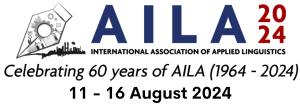Prof. Richard Smith
University of Warwick (UK),
Overview: This symposium has been organized to mark the 60th anniversary of the foundation of AILA at the first International Congress of Applied Linguistics in Nancy, France, in October 1964. We take advantage of this occasion not simply to celebrate what applied linguistics and AILA have become but to interrogate their histories from critical perspectives, seeing if there are implications for future work. There has been little historical research into the development of applied linguistics (though see Linn, Léon and Candel, 2016; and de Bot 2023), perhaps due to a persisting tendency to view the field as a relatively ‘young’ one even compared with linguistics, which was itself still considered a new discipline in the 1960s. However, applied linguistics now seems strongly enough constituted for it to be viewed historically – especially if we date its inception still further back to 1948, the year the journal Language Learning was first published in Michigan with the subtitle ‘A Quarterly Journal of Applied Linguistics’. Indeed, as John Joseph shows in this symposium, the roots go (much) deeper even than that – and there are interesting, potentially empowering implications to be found in the way applied work has tended to be foundational for theoretical linguistics, rather than the (usually perceived) other way around. There may be various kinds of positive current value, in fact, in countering prevalent ahistoricity via engagement in applied linguistic historiography (Smith, 2016), even when conditions have clearly moved on. AILA itself has both internationalized and broadened its remit over time but, as Azirah Hashim and Richard Smith point out in their contribution, particular emphases and tensions within the association have persisted and can be productively viewed from a historical angle. Indeed, current moves to decolonize applied linguistics may particularly require a critical historical approach. Ruanni Tupas, in his paper, directly addresses the way applied linguistic research may be founded on colonial versions of history which are discursively embedded in our writing. Sinfree Makoni, Ashraf Abdelhay and Cristine Severo, in their own contribution, also question some key applied linguistic notions by situating them historically in situations of colonialism and conflict. Looking back, then, especially in times of crisis, has the potential to provide bearings for future work. In the last contribution to the symposium, Claire Kramsch engages in some personal retrospection to trace a path for future development of the field, further highlighting the value of critical historical research and reflection for current, applied concerns.
de Bot, K., 2015. A history of applied linguistics: From 1980 to the present. Routledge.
Candel, D., Léon, J. and Linn, A. (eds), 2011. Linguistique appliquée et disciplinarisation. Histoire–Épistémologie–Langage 33(1).
Smith, R. 2016. Building ‘Applied LInguistic Historiography’: Rationale, scope and methods. Applied Linguistics, 37(1), 71–87.
Keywords: history of applied linguistics, applied linguistic historiography, AILA, coloniality

